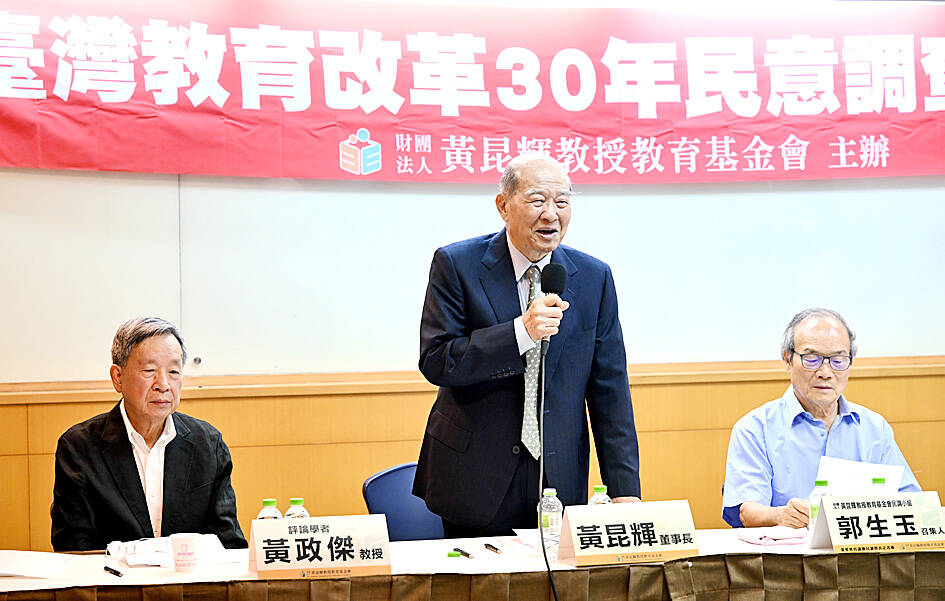About 88 percent of people think the government should call a national conference to discuss education policies, the Professor Huang Kun-huei Education Foundation said yesterday.
In a survey conducted by the foundation, more than half of the respondents said they were not satisfied with the outcomes of the education reform 30 years after the “410 Demonstration for Education Reform” march on April 10, 1994.
The march, staged by nongovernmental groups, prompted the government to set up the Commission on Educational Reform as part of the Executive Yuan.

Photo: Lo Pei-de, Taipei Times
The commission spent two years on research and published The Consultants’ Concluding Report on Education Reform (教育改革總諮議報告書), prompting the education reform, which profoundly influenced the middle-aged and younger generations in Taiwan, foundation chairman Huang Kun-huei (黃昆輝) told a news conference in Taipei.
The survey showed that “providing students with more opportunities to develop personal capabilities and interests” was a crucial positive outcome of the education reform, which earned recognition from 53.3 percent of the respondents, he said.
However, most of the respondents did not find the reform as satisfying in other aspects, he said.
The foundation said that 54.1 percent of the respondents are not satisfied with the reform’s overall outcome, while 51.5 percent are unsatisfied with the decision to open more high schools and universities to reduce academic pressure.
On the other hand, 53.4 percent of the respondents are dissatisfied with the reform’s effectiveness in facilitating social mobility, while 61.2 percent think the reform failed to increase students’ adaptability and competitiveness, and 65 percent are worried about devaluation of college degrees.
About half of the respondents think the reform failed to achieve its goals of “taking care of each student” and “diversifying teachers’ cultivation.”
Meanwhile, about 88 percent of the respondents said that the government should call a national conference on education to discuss policies, while 67 percent agreed that the compulsory education should include five-year-olds, Huang said.
Respondents from Kaohsiung, and Pingtung and Penghu counties are concerned that technical and vocational education is being marginalized, foundation director Feng Ching-huang (馮清皇) said.
Including five-year-old children in compulsory education is the key to providing comprehensive education, foundation poll committee convener Kuo Sheng-yu (郭生玉) said, adding that the National Child Care Policy for Children Ages 0-6 is not enough.
The foundation initiated the discussion about the education reform to unveil the real problems and prepare Taiwan for future education rather than finding someone to blame, Huang said.
Educational groups on April 9, before President William Lai (賴清德) took office, urged him to convene a national conference on education to reach a consensus on policies.
The foundation conducted the nationwide telephone survey among Taiwanese aged 20 or older from May 24 to 27. It had 1,068 valid samples, including 302 via mobile phone, with a margin of error of 3 percentage points, it said.

Chinese Nationalist Party (KMT) Chairman Eric Chu (朱立倫), spokeswoman Yang Chih-yu (楊智伃) and Legislator Hsieh Lung-chieh (謝龍介) would be summoned by police for questioning for leading an illegal assembly on Thursday evening last week, Minister of the Interior Liu Shyh-fang (劉世芳) said today. The three KMT officials led an assembly outside the Taipei City Prosecutors’ Office, a restricted area where public assembly is not allowed, protesting the questioning of several KMT staff and searches of KMT headquarters and offices in a recall petition forgery case. Chu, Yang and Hsieh are all suspected of contravening the Assembly and Parade Act (集會遊行法) by holding

PRAISE: Japanese visitor Takashi Kubota said the Taiwanese temple architecture images showcased in the AI Art Gallery were the most impressive displays he saw Taiwan does not have an official pavilion at the World Expo in Osaka, Japan, because of its diplomatic predicament, but the government-backed Tech World pavilion is drawing interest with its unique recreations of works by Taiwanese artists. The pavilion features an artificial intelligence (AI)-based art gallery showcasing works of famous Taiwanese artists from the Japanese colonial period using innovative technologies. Among its main simulated displays are Eastern gouache paintings by Chen Chin (陳進), Lin Yu-shan (林玉山) and Kuo Hsueh-hu (郭雪湖), who were the three young Taiwanese painters selected for the East Asian Painting exhibition in 1927. Gouache is a water-based

Taiwan would welcome the return of Honduras as a diplomatic ally if its next president decides to make such a move, Minister of Foreign Affairs Lin Chia-lung (林佳龍) said yesterday. “Of course, we would welcome Honduras if they want to restore diplomatic ties with Taiwan after their elections,” Lin said at a meeting of the legislature’s Foreign Affairs and National Defense Committee, when asked to comment on statements made by two of the three Honduran presidential candidates during the presidential campaign in the Central American country. Taiwan is paying close attention to the region as a whole in the wake of a

OFF-TARGET: More than 30,000 participants were expected to take part in the Games next month, but only 6,550 foreign and 19,400 Taiwanese athletes have registered Taipei city councilors yesterday blasted the organizers of next month’s World Masters Games over sudden timetable and venue changes, which they said have caused thousands of participants to back out of the international sporting event, among other organizational issues. They also cited visa delays and political interference by China as reasons many foreign athletes are requesting refunds for the event, to be held from May 17 to 30. Jointly organized by the Taipei and New Taipei City governments, the games have been rocked by numerous controversies since preparations began in 2020. Taipei City Councilor Lin Yen-feng (林延鳳) said yesterday that new measures by